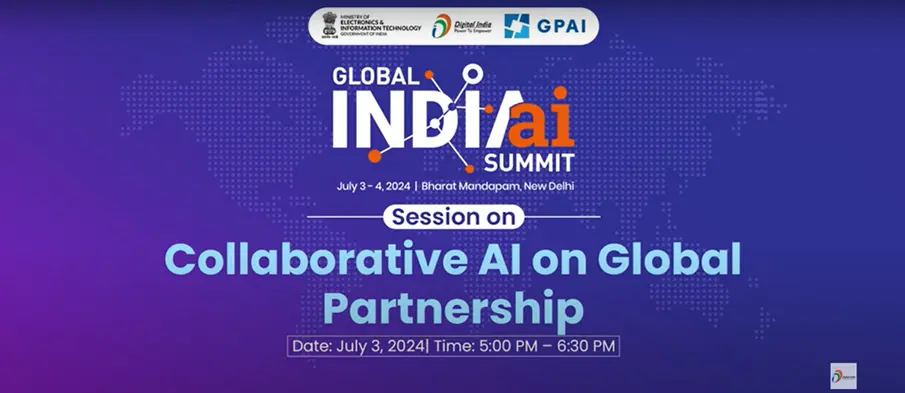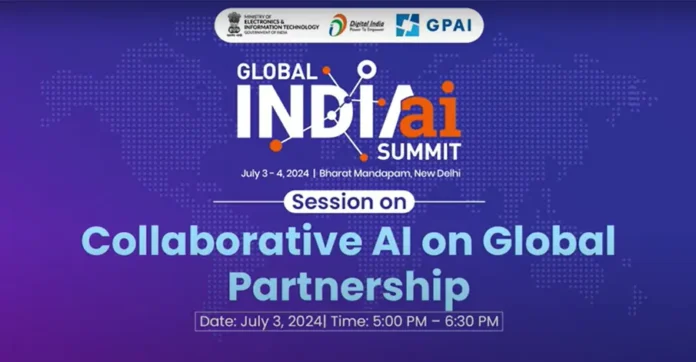
The Global India AI Summit held last week brought together thought leaders to delve into AI’s potential for global development, underscoring the necessity for collaborative and inclusive approaches. Esteemed speakers included Mr. Anirudh Suri ,Managing Partner, India Internet Fund, Mr. Vishal Duper ,MD, South Asia, NVIDIA, Ms. Jaya Jagdish ,Country Head and Senior Vice President, AMD India, Dr. Kalika Bali ,Principal Researcher, Microsoft, India, and Ms. Annabel Lee ,Director, Digital Policy (APJ), AWS , who provided valuable insights on AI’s role, particularly in the Global South.
A significant emphasis was placed on Collaborative AI’s role in fostering sustainable development. Shri Rohit Rathish from the Ministry of External Affairs highlighted this approach’s importance, stating, “To harness AI for global good, nations need to explore Collaborative AI for Sustainable Development.”
Balancing Innovation with Access and Inclusion
Discussions stressed the importance of balancing innovation with ensuring access and inclusion. Achieving this balance is crucial to leveraging AI’s benefits globally without making it prohibitively expensive.
The introduction of Digital Public Infrastructure (DPI) by the Indian G20 presidency was recognized as a significant step toward addressing access, equity, and inclusion challenges. DPI aims to create frameworks for broader access to digital technology, a central topic of the summit.
Need for Global Governance Mechanisms
The need for global governance mechanisms was highlighted, particularly with the expanding use of digital currencies and payment systems. There is a growing recognition of the necessity for coordinated efforts to develop comprehensive global frameworks.
Rapid Digitalization in the Global South
Recent World Bank statistics reveal that e-payment transactions in the Global South are growing 3.5 times faster than in other regions. This rapid digitalization underscores the need for adaptive policies and innovative solutions.
India’s Leadership in AI Research and Development
India’s leadership in AI research and development and its focus on inclusivity and equitable growth were prominently highlighted. The Development Partnership Administration (DPA) in India plays a pivotal role in fostering global partnerships and development projects across the Global South.
Mr. Anirudh Suri emphasized the importance of the Global South building AI competitiveness to influence AI governance. He noted, “Without competitiveness, discussions on ethics and governance become less impactful,” stressing the need for access to compute power, R&D, talent retention, and ethical data usage.
Local Adaptation and Effective Partnerships
Mr. Vishal Duper advocated for clear agendas and local adaptation of AI tools, highlighting India’s potential to address unique problems through effective partnerships. He remarked, “India should leverage its scale to drive innovation and address local needs.”
Ms. Jaya Jagdish emphasized the necessity of collaboration between governments, industries, and academia to advance AI in the Global South. She stated, “Support startups with collaborative efforts and infrastructure to foster innovation.”
Multilingual Approaches and Balancing Regulation with Innovation
Dr. Kalika Bali emphasized the Global South’s unique opportunity to set the agenda for transformative AI technologies. She advocated for multilingual approaches and balancing regulation with innovation, stating, “Regulations should spur innovation while accommodating diverse needs.”
Overcoming Challenges and Promoting Skill Development
Ms. Annabel Lee discussed challenges such as internet connectivity and the need for continuous skill development. She noted, “Generative AI can democratize access to technology, but continuous support for infrastructure and training is crucial.”
Conclusion and Forward-Looking Reflections
The summit underscored AI’s transformative power and the need for balanced, inclusive development. Collaborative efforts are crucial to bridging the digital divide and ensuring equitable AI benefits, particularly for underserved regions in the Global South. The summit’s insights reflect a commitment to harnessing AI for global good through collaboration and inclusive development.





